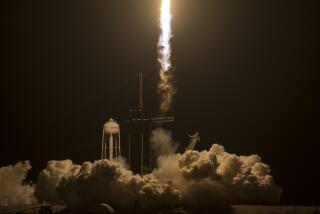Latest rocket failure spurs concern about Russia’s space program
The Russian Proton-M rocket that blew up seconds after blastoff Tuesday destroyed three satellites worth $200 million, spurred authorities to indefinitely delay two other launches this month and damaged the image of Russia’s lucrative commercial space industry.
The rocket, which appeared to stall and roll about 10 seconds after it was launched, also spewed 600 tons of toxic fuel across the launch pad and surrounding steppe of the Baikonur facility in Kazakhstan, raising fears of contamination and further strain in Moscow’s relationship with its former Soviet sister republic.
Russia rents the Baikonur facility and its few surrounding villages from Kazakhstan on a lease that expires in 2050. But environmental damage at the remote space center and at the Semipalatinsk nuclear test facility have become points of contention between the Kremlin and leaders of now-independent and economically diversifying Kazakhstan.
A Russian space agency official was quoted by the RIA-Novosti news agency as saying work at Baikonur is likely to be suspended for two to three months to clean up the fuel dumped across a wide swath around the crash site.
Tuesday’s rocket failure was “another setback for Moscow’s space program,” RIA-Novosti stated, recalling a 2010 Proton-M rocket crash that destroyed three other satellites intended for the Russian GLONASS system, a global positioning network like the GPS that guides American drivers, hikers, golfers and fliers.
Another Proton-M failed in August 2011, an incident blamed on a control system malfunction, and complications with the Briz engine on the rocket scrapped a Proton mission last summer. In December, a booster failed to lift the Proton to its planned satellite deployment position, necessitating a second mission to put the satellite into the correct orbit, the Russian space agency Roskosmos reported at the time.
In July 2006, a Russian Dnepr rocket carrying 18 satellites, mostly for foreign clients including the United States and Italy, crashed a minute and a half after launch, destroying its entire payload and setting back Russia’s commercial launch agenda for months.
A Proton-M rocket had been scheduled to carry an Astra 2-E satellite into space on July 20, and four days later a Progress 52 spacecraft was to left off from Baikonur with supplies for the International Space Station. Both will be delayed, RIA-Novosti said, quoting an unnamed Russian space agency official.
Live coverage of the Proton-M rocket blast at 8:38 a.m. local time was carried by Rossiya 24 television, which followed the 17-story-high craft as it traced an arc into the cloudy skies for about 10 seconds, then wobbled, tilted to its side and plunged in a burst of fire that scattered pieces of the rocket and the satellites it was carrying. The charred debris landed about 1.5 miles from the launch site. A fiery cloud enveloped the plummeting wreckage, spreading the toxic fuel across a wide area of the uninhabited launch facility.
Evacuation of the nearest town, about 40 miles away, was initially considered. But rain fell shortly after the crash, arresting the drift of the poisonous smoke, and residents of towns and villages downwind of the site were instead advised to stay indoors and keep their windows closed, said the head of Kazakhstan’s Emergencies Ministry, Vladimir Bozhko.
Prime Minister Dmitry Medvedev ordered his deputy, Dmitry Rogozin, to set up an accident investigation team, Itar-Tass reported. The news agency quoted Medvedev spokeswoman Natalia Timakova as saying the prime minister, alarmed at the loss of 10 satellites in seven rocket failures in little more than a year, had demanded a list of “the guilty persons,” including high-ranking officials of Roskosmos.
Tuesday’s Proton-M launch was the fifth so far this year and also the fifth failure of the rocket since December 2010, according to Space.com.
The Proton-M rockets, developed during the Soviet era, are produced at the Khrunichev State Research and Production Space Center in Moscow. The program has also been plagued by corruption allegations, and the rocket’s chief designer was fired last year after a fraud investigation.
ALSO:
Palestinian president expresses optimism after Kerry’s visit
In a strange political collision, Obama and Bush meet in Africa
Egyptian leader appears to reject army’s ultimatum to deal with crisis
More to Read
Sign up for Essential California
The most important California stories and recommendations in your inbox every morning.
You may occasionally receive promotional content from the Los Angeles Times.









